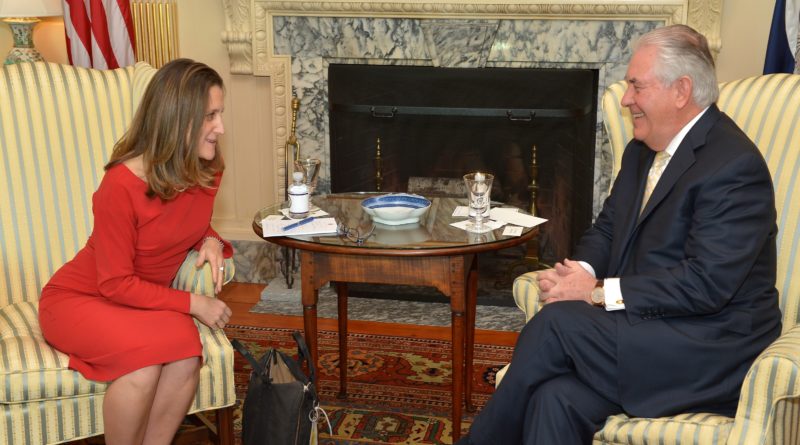The Case for Canadian Caution in the Upcoming NAFTA Negotiations
By Sheldon Birkett, Research Associate at the Council on Hemispheric Affairs
To download a PDF of this article, click here.
Upcoming trade talks concerning the renegotiation of the North American Free Trade Agreement (NAFTA) are expected to take place between August 16 and 20 in Washington, D.C. One of Trump’s key election promises was to “re-deal” the 23-year-old trade agreement, calling it “the worst trade deal” ever signed by the United States.[i] Meanwhile in Canada, Foreign Affairs Minister Chrystia Freeland is “anteing-up” the Canadian side of the bargain. Freeland is creating a special advisory council on all aspects of trilateral agreement concerning the United States and Mexico.[ii] Freeland is determined to take a firm stance on “defending Canada’s national interest,” as stated on July 17, 2017 by Global Affairs Canada.[iii] Although Canada is open to the opportunity to “modernize” NAFTA, The Canadian Press reported that Global Affairs Canada is also determined to “protect and promote Canada’s interest in the NAFTA negotiations.”[iv] When facing a volatile U.S. administration, the “Canada First” approach should tread lightly or face a lose-lose situation for corporations at best. At worst, it would face retaliation from the Trump administration, possibly escalating into an all-out trade war. Despite the nationalistic sentiment to promote each country’s respective “interests,” whatever they may be, the real losers of NAFTA’s termination would be the corporate elite. If Canada backed-out of NAFTA, reverting to the WTO’s most favored nation tariff rates, additional costs would only amount to USD $4.1 billion, a mere 1.47 percent of Canada’s total exports; having a modest impact on the Canadian economy, but by no mean catastrophic.[v] NAFTA is largely comprised of non-trade elements – such as Intellectual Property Rights and Investor State Dispute clauses – aimed at supporting extraneous de-regulation in the interests of increasing corporate profits. At the upcoming Washington trade talks, Minister Freeland must stand strong in negotiations with the U.S. Chief NAFTA negotiator, John Melle — promoting the interests of all Canadians, not just the corporate few.
By Sheldon Birkett, Research Associate at the Council on Hemispheric Affairs
Additional editorial support provided by Jim Baer, Senior Research Fellow and, Mitch Rogers, Extramural Contributor, and Madeline Asta and Martina Gugliemone, Research Associates at the Council on Hemispheric Affairs
[i] Julie Hirschfeld Davis and Alan Rappeport, “After Calling Nafta ‘Worst Trade Deal,’ Trump Appears to Soften Stance,” The New York Times, March 30, 2017, https://www.nytimes.com/2017/03/30/business/nafta-trade-deal-trump.html.
[ii] Joan Bryden, “Canada beefs up trade team ahead of NAFTA renegotiation,” The Canadian Press, August 2, 2017, http://www.macleans.ca/economy/canada-beefs-up-trade-team-ahead-of-nafta-renegotiation/.
[iii] “Statement by the Foreign Affairs Minister on the North American Free Trade Agreement,” Global Affairs Canada, July 17, 2017, https://www.canada.ca/en/global-affairs/news/2017/07/statement_by_theforeignaffairsministeronthenorthamericanfreetrad.html.
[iv] Joan Bryden, “Canada beefs up trade team ahead of NAFTA renegotiation,” The Canadian Press, August 2, 2017, http://www.macleans.ca/economy/canada-beefs-up-trade-team-ahead-of-nafta-renegotiation/.
[v] Pierre Laliberte and Scott Sinclair, “What is the NAFTA advantage?” Canadian Centre for Policy Alternatives, June 2017, https://www.policyalternatives.ca/sites/default/files/uploads/publications/National%20Office/2017/06/What_is_NAFTA_Advantage.pdf.


